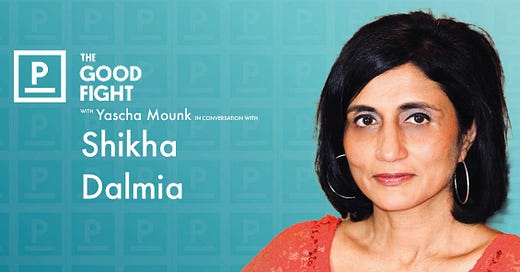Thanks for reading! The best way to make sure that you don’t miss any of these conversations is to subscribe to The Good Fight on your favorite podcast app.
If you are already a paying subscriber to this Substack or Persuasion, this will give you ad-free access to the full conversation with Shikha, plus the exciting bonus episodes we have in the works! If you aren’t, you can set up the free, limited version of the feed—or, better still, support the podcast by becoming a subscriber today!
Shikha Dalmia, a writer and journalist, is the founder of the Institute for the Study of Modern Authoritarianism and of The UnPopulist, an editorial partner of Persuasion.
In this week’s conversation, Yascha Mounk and Shikha Dalmia discuss her journey from socialist India to the American libertarian movement; how mainstream libertarianism failed to meet the challenge posed by Donald Trump; and the proliferation of populist attitudes among the American electorate.
The transcript and conversation have been condensed and lightly edited for clarity.
Yascha Mounk: We've been in conversation for a long time, so I’ve really looked forward to this. And I have a sense of your backstory, but I've never really had you tell it to me.
So you really were a member of the libertarian movement for a long time. You were a journalist at Reason Magazine and lived in that kind of libertarian world. What drew you to libertarianism originally?
Shikha Dalmia: I grew up in India, went to college there, and actually worked there as a reporter when Indira Gandhi was assassinated. India at that time was pre-liberalization, so it was very much in the thrall of a sort of Fabian socialist framework of central planning. Even though Indira Gandhi had made it her campaign pledge over and over again to eradicate poverty, it was nowhere close to doing that. This famous Hindu rate of growth was 2%. And India was also a very traditional society at that time.
Those two things, the traditionalism of India and the socialism of India, didn't quite work with my rebelliousness. So when I discovered some libertarian thinkers—and Ayn Rand is the gateway drug for a lot of us—it's very liberating, it's exhilarating, the message that your life is your own to live the way you choose; that there is an economic system that doesn't depend upon having to apply to the government for onerous permissions and licenses. Those are all very, very heady ideas. I went on to read Milton Friedman. When I moved to the United States for graduate studies, interestingly, I went to Louisiana State University for a degree in communications, and my professor was a man called John Calhoun Merrill. He was named after a segregationist. And interestingly, he did not have a racist bone in his body, right? He was my mentor. And he introduced me to other libertarian thinkers that I had not been familiar with: Hayek, who has been and will always be an abiding influence on my part; Ludwig von Mises, there was this whole tradition of Austrian school economics.
Mounk: Going back to what you felt was wrong with India, I first visited in the end of 2005 and I was in Kolkata, which at the time was changing quite rapidly. but West Bengal at the time was still ruled by the Communists. And so I think I still got just about a window into the old India. And I remember coming to a city, not just with tremendous poverty, but with the only car on the street being the Ambassador, which was the one kind of model of car that India used to have. And I accompanied a friend on a couple of bureaucratic errands, standing in line for hours in order to get some very simple bureaucratic process done and being treated like a worthless supplicant (unless, of course, you were willing to pay).
Take us a little bit into those frustrations and why you think that really held back India's economic growth.
Dalmia: Yes, everything you described was my life growing up in India, we lived middle class lives and which was infinitely better than for those who were living below the poverty level. I think the formal definition of poverty is $1.50 a day. If you are under that, you're poor. And there's still rampant poverty in India. There are still 300 million people who live below that level. So even now when you go to India, the poverty is kind of staggering, visually. But what you just described was our life. To get a telephone connection, you either needed to be connected to somebody in the communications ministry, or you have to pay some “babu,” as we call them—enormous sums of bribes.
And our first car was, I think, 15 years old and it was a used Ambassador. I grew up in New Delhi. There was just this immense scarcity all around you. There was always a competition for goods on the one hand and for positions, economic opportunities, on the other. If you were the crème de la crème and managed to get into the IITs, Indian Institutes of Technologies, which were part of Jawaharlal Nehru's Fabian socialist architecture, where he was trying to create these temples of industry—and he created these very, very meritocratic engineering schools—if you got there or if you got into a medical school, you were fine, but there were very few positions. And it was a classic mentality of socialism that if you allow too much competition, it's wasteful. And of course the opposite was the case—the more markets you allow, the more supply of goods you get, the more you remove scarcity.
If you were anything other than a socialist, you were simply not taken seriously as an intellectual. And in that kind of an environment, you read Milton Friedman and you read Ayn Rand, and it opens your eyes in many different ways. They tell you there's a better way, you can get rid of the scarcity. This is not the way of life. Poverty may be the default condition of humanity, but it doesn't have to be the lived condition of humanity. All of that was very heady and eye-opening at that time.
Mounk: I think people by now will be convinced that you certainly at one point were a fully paid-up libertarian. And I think it's clear that you still retain many libertarian instincts and yet you've undergone a very interesting ideological evolution, which in a sense is parallel to that of many other people I know, but in a slightly different form—paid-up conservatives, who were a clear part of the Republican alliance for very long time and who, when Donald Trump came along in 2015 and 2016, in a very honorable way, said, “This is where my political space is going. This is where my friends and colleagues are going. And this is where I shall not go, because the reasons to object to both his vision of politics and his personal conduct are deep enough to make that impossible for me. And I'm going to break with my political space, my political movement.”
In some ways, you've undergone a similar evolution, except that libertarianism is rather different from conservatism. And one might argue in the sense that the core libertarian institutions haven't gone full pro-Trump in nearly the same way as the traditional conservative institutions. So explain to us why the rise of Donald Trump and what has happened in the libertarian ecosystem since have made you feel that it is no longer where you can hang your hat.
Dalmia: Libertarianism is the one philosophy that puts at the heart of its political project stopping state tyranny and guaranteeing individual freedom—those things go hand in hand, according to libertarianism. Conservatives put virtue politics, a virtuous society, at the heart of their political project, and progressives put equality and justice at the heart of their political project. But libertarians put state tyranny and individual freedom at the heart of their political project. So you would have thought when the closest thing to an authoritarian comes along in this country, libertarians would lead the charge against Donald Trump.
The Libertarian Party has been completely taken over by the MAGA wing, but the mainstream libertarian movement didn't quite line up behind Trump like some conservatives did, right? And yet, there is not a single Never Trump libertarian you could name. The Reagan fusion of conservatism consisted of neoconservatives who were foreign policy hawks and paleoconservatives who were traditional conservatives and believed in traditional values. And then you had libertarians who were limited government, free market, individual liberty types. The neoconservatives and the paleoconservatives have actually spawned Never Trump movements. They are rump movements. They have broken away. But mainstream libertarianism could not actually support a single Never Trumper. There is no major intellectual among libertarians who is identified as a Never Trumper. The closest is George Will, and he works for a mainstream publication, The Washington Post. He doesn't work for a libertarian outfit.
My formulation for libertarians is that they didn't sell out to MAGAism. They didn't start wearing MAGA hats, but they did abdicate. They didn't do what you would have expected them to do. And that was like a huge wake-up call for me because I was constantly in the same conversations that I was having with socialists in India, saying, no, this is wrong. Now I was arguing something similar in my broader center-right circles and even libertarian circles as to why Trump is a fundamentally different kind of politician. And he represents really an existential threat to the values that we all hold dear. That was the breaking point for me with libertarianism. They just did not take the threat of Trump seriously enough.
Mounk: So help me understand this point, because I think it's a subtle one. When you look at social conservatives, for example, 90% have gotten on board with Trump, and they are vocally pro-Trump, trying to use their influence to get him re-elected. But then there are social conservatives like our friend David French who broke away from that and are making a stand of conscience in saying “this is unacceptable to me.” In the libertarian space, you don't have that stark division between the 90 percent and the 10 percent. Rather, you have people who say, “Well, look, we were always standing a little bit apart, we were never very easily part of the Republican coalition.” And so there are plenty of people within that movement who say they’re not going to vote Trump, right? I think probably a lot of libertarians and mainstream institutions do not vote for Trump. I would be surprised if a majority of them do. Perhaps a plurality, but I'm not even sure about that.
So I guess we can distinguish between three different reactions you might have. One is to go along with Trump as a propagandist. The Libertarian Party has done that, but when you look at Reason Magazine or the Cato Institute and so on, there's very, very few people like that. The second is to privately vote for Donald Trump, but not make that a big part of your identity. There's some, but it's not even that many, right? The third kind of category, I guess, is someone who might vote for Hillary Clinton, Joe Biden, or Kamala Harris, despite having deep disagreements with them on economic policy and things like teachers unions and so on—they might vote for them, but they’re not making it the center of their work. And it seems to me that that is really where your beef is, with that third category. Your target is the person who's saying, “I'm just gonna focus on something else.”
Dalmia: Yes. That's right. So this is partly my beef with libertarianism. As you said, libertarians had a very complicated relationship in this conservative fusionism. They do hold individual freedom and state tyranny as the heart of their political project. And with individual freedom, you have one strand of libertarianism which believes in radical self authorship, which puts it in sort of a progressive camp. But you also have a different kind of paleo-libertarianism, which actually believes in certain traditional values and a traditional order. And they think freedom is about affirming that and stopping the assaults of the left on this traditional order. So you have a paleo and you have a progressive wing of libertarianism. But libertarianism always saw its mission as “a pox on both your houses.” You both are wrong. You both don't put individual liberty at the heart of your political project. You want to control individuals in different kinds of ways. Progressives want to take individual wealth and redistribute it. And conservatives want to mess with what you are doing in your bedroom. And we want government to be out of the boardroom and out of the bedroom.
But it was never an equal pox on both your houses. The fusion with conservatism meant that a fair number of right-wing-inflected libertarians joined the movement. And for all kinds of reasons, a lot of right-wingers became libertarians because they believed in states' rights. And libertarianism has something to say about that. You know, libertarianism believes that the government that's closest to the people is the most accountable form of government; therefore the more decentralized the power, the easier it becomes to control it. But what the states rights’ movement also did was give a hospitable home to all kinds of Confederate ideas. And they are all part and parcel of libertarianism, with the result that, when Trump comes along, libertarianism simply could not get out of its old mode of thinking.
Mounk: I do want to make sure that we cover one of the projects that you've had at your institute and at The UnPopulist, which is an interesting survey of Donald Trump's voter base.
There's obviously a complicated debate about who exactly should qualify as a populist, what it is that we should take as a definition of populism. I've talked about that many, many, many times in early episodes of the podcast. I still talk about it a lot in the classroom with my students where we reach these different definitions of populism and debate whether it's a helpful term and what the best definition is. For the purposes of understanding this electoral cycle, how should we think about populism and what does that tell us about who supports populist candidates like Donald Trump right now in the United States?
Dalmia: As you said, populism is a highly contested term, right? But the reason my publication is called The UnPopulist is that I think there is something happening in the world globally, where you've got the rise of these strongman figures and they're getting elected democratically, right? We need a name for it. And I think the closest term, despite all the disagreements, is populism. And populism is a fundamentally insidious kind of a force because, in liberal polities, we depend on the people to guard their freedoms against the tyrant. But when the people actually elect one and then don't care about their freedoms and what he's doing to the system, that becomes a fundamental problem. Usually, if an authoritarian comes and takes away people's freedom, you can expect the people to mount a resistance. But here they are saying, “You do what you want.” In the United States, we were completely taken flat footed by the phenomenon of Donald Trump.
Souhaitez-vous - ou quelqu'un que vous connaissez - avoir accès à tous ces articles et conversations en français ? Cliquez sur ce lien et activez “en français” sous Notifications ! 🇫🇷
Mounk: The experience of many of those countries, particularly with systems of proportional representation, is that these parties were basically always there. For a long time, they got 2 or 3% of the vote. Then they started getting 7, 10, and 15% of the vote, and people had time to get alarmed about this, whereas in a two-party system, it tends to work more as a hostile takeover. And so you can more or less ignore populism until suddenly it's in charge of one of the major parties.
Dalmia: That's right. And so we decided to actually do a poll on populism and create a model of populism and start creating baselines of popular sentiment. We constructed a model of populism, which has basically four elements to it. The people feel a very direct and personal connection with their leader, their candidate, or his policy, his or her policy agenda. They are okay with the leader doing an end-run around parliamentary procedures to promote this agenda. There is a certain level of grievance and hostility towards elites, governing elites and then other social elites. And there are out-groups who are considered to be fundamentally not part of the national community but whom the elites are in some ways coddling or privileging or not checking sufficiently. We created a 54 question survey, and YouGov administered the survey for us. And as you know, populism can be a phenomenon of the right or the left. And so our instrument is actually politically neutral. Regardless of where popular sentiment emerges in future, we'll be able to pick it up, which is part of the purpose of doing this.
But what we found was, as was expected, Trump is far more populist than any other candidate. We actually also polled RFK Jr., because at that time he was still a candidate. And so there are 36% of Trump supporters who could be classified as hardcore populists. There are 29% of RFK supporters who are hardcore populists. And there are only 15% of Kamala Harris supporters who are populists. A couple of things actually stand out in the poll: Trump supporters, demographically, as one would expect, are older. Two-thirds of them are over 55. They are whiter, more Roman Catholic and Protestant. Many of them are born again. And they tend to be slightly less educated than the average American, but not that much. And they are much more patriotic. And they have far, far greater hostility to social elites. But on governing elites, which is essentially politicians and bureaucrats, interestingly, both Kamala Harris' populists and Trump supporters are equal—they both hate politicians and they both hate bureaucrats.
Now, the reasons might be quite different, but there is this widespread skepticism of governing elites in the United States. And the other interesting element of the survey was that Kamala Harris' supporters are actually just as much as Trump supporters and even slightly more willing to let her subvert constitutional parliamentary norms and use executive power to get her way. So there is clearly something brewing over there.
Mounk: So I think the survey is really interesting and insightful and you gave us a great overview of it. But what does it tell us about Trump supporters more broadly? I think the picture that emerges very clearly is that about 14 to 15 percent of the population are these populist Trump supporters, strong supporters of Donald Trump who are strongly supportive of not just executive overreach, but also of very worrying rhetoric about social out-groups; they are very unlikely to accept the outcome of the election. I buy all of that.
What I found puzzling looking through the poll or the question that the poll raised in my mind was what about the other Trump supporters? Because one thing that I've thought throughout 2016 to 2020 and for the last four years as well is, you know, I care less about the true fanatical Trump supporters than I do about the reluctant Trump supporters. When you look, for example, at the percentage of respondents who show that they have a populist attitude towards the social outgroup, there is a clear distinction between Harris supporters and the broader universe of Trump supporters, particularly on illegal immigrants. But actually, not many Trump supporters have those populist attitudes towards social out-groups (other than illegal immigrants). 15% about Muslims, that's worryingly high. But it's a minority. 19% about transgender people, again high, but four out of five don't. 11% about gays and lesbians, now we’re down to one in 10. 3% about Jews or blacks or Hispanics; that's one in 33.
So when we get to the broader universe of people who are voting for Donald Trump, but who may not have these negative attitudes towards out-groups, who may have some concerns about preserving constitutional limits, who aren't fanatically in the tank for Trump, who probably are quite aware of his personal limitations, of the fact that he's irresponsible—does the poll or your broader political thinking tell us anything about how to reach those people?
Dalmia: We were focused on measuring populist sentiment and his populist base because that's something that other polls are not doing. But yeah, you are absolutely right. We were surprised by the attitudes towards other social groups, other than undocumented immigrants. I mean, this country has been consumed with conversation about trans issues and gay issues and there are quite a number of religious conservatives who are very worked up about those issues. But in the general MAGA-verse, they are not getting nearly as much traction as they are in particular right-wing circles. I'm not sure exactly what to make of them. But I still think what has happened is that Trump has really moved the Overton window on the rhetoric about undocumented immigrants. His rhetoric is off the charts: They're poisoning the blood of the United States and they've got bad genes. And that pulls people who are in his orbit in that direction. He hasn't yet gone after trans people and gay people in a similarly vicious way. Maybe we have made enough gains in convincing people that some space for trans presence and acceptance of equal rights for gays has now become part and parcel of the American political thinking and we don't have to worry about it. I frankly am a little bit doubtful. Trans and gay issues may well be JD Vance's issues. And if he proves to be an effective demagogue, he may well move the needle on that, right? Which is why our poll is so important, constantly monitoring these sentiments. So yeah, we'll see how this goes, but if you look at the rhetoric of immigration and the sentiments towards immigrants, Ronald Reagan and George H.W. Bush's rhetoric about immigrants could not have been more different.
It's sad and depressing to see how much things have fallen in this country. I mean, I was just watching this video between Reagan and George H.W. Bush, both of them are in this conversation. And George H.W. Bush is saying things like “Mexican immigrants, they are good people, they are strong people. Many of my family members are Mexicans.” And Reagan was saying that the way to solve the border crisis is not to build a wall, but to open the border on both sides, that you have a free flow of people coming and going—Mexicans can come here on work visas, work and then leave. And that rhetoric is impossible now. I mean, you get laughed out of court in right-wing circles if you say something like that. Given how much our rhetoric on immigration has shifted, it stands to reason that attitudes towards immigrants are also shifting. And if the rhetoric similarly shifted towards the other social out-groups, who knows where the country would go.
In the rest of this conversation, Yascha and Shikha discuss their disagreement over whether identitarians of the left are right or wrong on their fundamental goals. This discussion is reserved for paying members...
Listen to this episode with a 7-day free trial
Subscribe to Yascha Mounk to listen to this post and get 7 days of free access to the full post archives.














